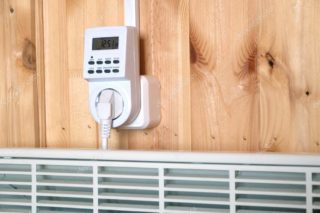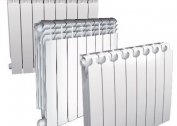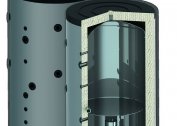The issue of heating in the house is one of the most important. Situations can be different: early autumn cooling, interruptions in the boiler room, an accident. An additional source of heat in the house will not be superfluous. Therefore, you need to know what is best - a convector or oil heater, when you need to choose a device for heating a house, apartment or cottage.
Principles of operation of heaters
The convector from the oil heater differs in the principle of operation. The radiator is a metal tank into which mineral oil is poured. When heated, it transfers heat to the heating element. The ribbed surface of the heater gives off heat more fully.
The convection apparatus is made in the form of a flat metal box with slots. Through them, air circulates and heats the room. Heat transfer occurs due to the spiral inside the case.
Advantages and disadvantages
The advantages of an oil device.
- The unit is not difficult, so it is in demand, its cost is affordable.
- Ribbed body design increases heat transfer.
- The device can be installed in the room, the wheelbase helps to easily move it in the right direction.
- Direct thermal radiation. There is no draft or dust movement from the apparatus.
- Even after turning off the equipment, heat continues to come from it for a long time.
Heater disadvantages:
- The appliance does not heat up immediately. A long warm-up time is typical for older models in which there is no fan heater.
- Uneven air heating. It can be hot next to the appliance, while at the other end of the room it is still cold.
- Lack of correct operation of the thermostat. The device can not always correctly determine the room temperature due to its uneven heating.
- The large dimensions of the device do not always allow you to install it in the right place.
- There is a possibility of getting a burn from the surface of the unit. Safety is important, especially if there are children in the house.
- A big flaw in technology are small cracks that gradually appear on the case. This leads to oil evaporation and improper operation of the device.
- Possible overheating can cause a fire, especially if there are things near the device that could catch fire.
The convector has the following advantages:
- Heating occurs much faster by moving masses of air.
- The case, unlike the oil one, does not heat above 60 degrees. Therefore, such devices can even be placed in the nursery.
- Automation works correctly. Heating can be programmed to a specific temperature.
- The device does not have open heating elements, does not emit unpleasant odors when heated.
- Convection-type appliances are available that have a special enclosure with protection against water. Such heaters can be installed in pools or saunas.
- The convector is compact, it can be put on the floor, there are wall mounted models of the wall, as well as baseboards, in the form of thin long panels.
- The device fits easily into the interior, it can be designed at the request of the customer with a color print.
The disadvantages of the device:
- At the beginning of work, the movement of cold air causes a draft of drafts. Not everyone likes it.
- The movement of air is accompanied by the movement of dust. Therefore, it is especially necessary to do wet cleaning.
- Poor air heating is observed in a room with high ceilings and a large area.
A wall-mounted appliance is ineffective if the wall is poorly insulated. But this problem will be observed when installing any heating device. First of all, it is necessary to solve the issue of thermal insulation.
Devices and principle of operation of heaters
The principle of operation of the oil cooler has been known for a long time and is widely used. The heater located inside the device heats the liquid, and heat is transferred from it to the environment. The oil is used because it has a large heat capacity, heats up quickly and holds heat for a long time.
After reaching the set temperature, the device no longer consumes energy, but only gives off heat. The thermostat is connected as the coolant cools.
Which heater is better, oil or convector, can be seen from the device of the latter. The device is a thin rectangular case in which heating elements are placed. Convection allows you to evenly warm the air. Rational use of electricity through the use of a thermostat.
Comparison of key features
Indoor air heating period
The oil cooler heats up the oil for a long time, so the air in the room warms up slowly. But it also does not cool down immediately. After turning on the heater in the network, the heater is first heated, then the oil in which it is located, then the housing, from which heat is already transferred to the room. The highest temperature to which the appliance can heat up is +150 degrees. Some models can be equipped with a fan, this speeds up the heating of the room.
In a convector heater, the heater immediately begins to heat the casing of the device, its efficiency is 95%. But the heating rate is small, even less than that of oil, so the air warms up evenly, but slowly.
Electricity consumption
Comparing the oil and convector heater, you need to remember that in the first case there is such a feature as thermal inertia. The appliance slowly gives off heat and cools down as well. As a result of this, the radiator is less economical, consumes more electricity by 25%.
More favorable will be a convector. Although it heats up more slowly, its service life is longer.
Both the convector and the oil heater can be made in wall and floor versions. But the convector is much lighter, therefore it is more convenient to install and move.
Safety
When comparing reliability, convection devices certainly benefit. They do not heat up more than 60 degrees. Such a heater can be left unattended.
The oil device can heat up to 85 degrees. Some models have protective covers, units of a cheaper price range are made without protection. Violation of the operating rules may cause the device to explode; it cannot be left unattended.
Environmental friendliness
There are practically no differences in this quality between the devices. They are not harmful to health, the varnish and paint from the surface do not evaporate when heated. The movement of air from the converter causes dust particles to be raised.
Durability
When choosing between an oil cooler and a convector, you need to consider that the second option will last 20-25 years, it can be repaired in case of breakage. An apparatus with oil contents after 10 years of service begins to fail, as small cracks appear on its surface. It is already impossible to repair it, you need to purchase a new one.
Price
The cost of devices depends on their characteristics, power and functional features. It is not recommended to purchase too cheap devices, most likely, they will not last long.Dear brands of well-known companies are more expensive, but their reliability is higher. On average, at the same rates, oil heaters are cheaper.
The choice of a specific device depends on the preferences of the consumer. Nevertheless, a convector heater is more economical, compact, safe and durable.
Some indicators - heating temperature, environmental friendliness - in oil appliances are higher. But in general, the convector looks more modern, easily fits into any interior, less in weight and easier to install.
A mobile electric heater will help maintain the temperature in the house when necessary. Knowing the features of the types of these devices, you can choose the most suitable model.








